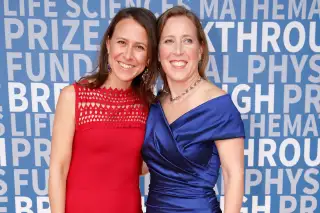Meet the Sisters Who Run YouTube and 23andMe — and Have a Collective Net Worth of Nearly $1 Billion

Success runs in the Wojcicki family.
Susan and Anne Wojcicki are sisters with superstar tech resumes. Susan, 50, is the CEO of YouTube and has long worked for Google. Anne, 45, cofounded and serves as CEO of the genetic testing website 23andMe. Their skyrocketing careers recently landed them on Forbes’ list of America’s Richest Self-Made Women, at No. 42 and No. 44, respectively. Susan’s estimated net worth is $480 million, while Anne’s is $440 million. Oh, and their other sister is no slacker: Janet is an anthropologist and an epidemiologist who works at University of California, San Francisco.
Appropriately enough given their Silicon Valley bona fides, the Wojcicki sisters grew up in the valley. They were raised in Palo Alto, home to Stanford. Their father Stanley was chairman of the university’s physics department and is now professor of physics emeritus. He fled Poland at age 12 in 1949 when Communists took over the country. Their mother Esther came from a family of poor Orthodox Russian Jews who immigrated to New York in the 1920s. She currently heads up a journalism program at Palo Alto High School (James Franco was a student).
The girls grew up on the university's campus and, by all accounts, quickly learned a sense of independence. “My parents really looked at us always as like mini-adults," Anne Wojcicki told CNBC. "I think the one thing that my parents really did is they gave us a taste of freedom. And they encouraged it. They encouraged us to find our passions, they weren't controlling.”
That meant that when Anne wanted to pursue figure skating, which the parents opposed—preferring she play tennis—they still let her follow through with her ambitions. But she had to pay for it herself. And she did through fundraising competitions.
"In some ways, it was the first example of me being stubborn where I said like, 'I know that you don't want me to do this. You want me to do tennis, and I'm not going to. I'm going to skate, and I'm going to figure out my own way to do it whether you support me or not,'" she said.
Education was also a bedrock principle for the family. "My parents were really clear like you should do something that's meaningful in the world. And I look at the Stanford campus community and the people I grew up with were people who did things that were meaningful. They weren't necessarily financially successful, but they were contributing to society in some way,” Anne said. “I felt pressure that I knew I had to go to college. I knew that my parents would be disappointed if I didn't put in my best.”
She and Susan rose to the challenge: Susan attended Harvard, while Anne went to Yale. Susan became Google’s 16th employee in 1999, working as the search giant’s first marketing manager. She went on to convince company brass to buy YouTube for $1.65 billion in 2006 (it’s now valued at $90 billion), leading to her top position at the Alphabet subsidiary.
Susan sold the YouTube pitch after Google started its own user-driven video service, and she uploaded its first clip: "a purple Muppet singing a nonsense song," she recalled in the book Measure What Matters. She then worked up a spreadsheet to justify the hefty price for YouTube, which had a larger market share.
Anne’s path was slightly more circuitous. She was a Wall Street analyst but quit that job to pursue medical school. Then she diverged again in 2006 to start 23andMe, a concept she launched with celebrity-attended spit parties, during New York Fashion Week (saliva provides the DNA used for the firm’s tests). She discussed the idea with her well-connected friends.
“I was sitting at a table at Allen & Company with Wendi Murdoch, Barry Diller, Diane von Furstenberg, Anderson Cooper, and Sergey, and we were talking about tongue curling,” Anne told The New York Times in 2008 as the startup was getting off the ground. “Barry cannot roll his tongue, but Anderson Cooper can do a really complicated four-leaf clover.”
Anne married Sergey Brin, a Google cofounder, with whom she has kids. But the two split in 2013 (which means that, yes, her sister works under her ex). That year turned out to be a bad one for Anne. It was also when the FDA ruled that 23andMe’s spit vial was “an unapproved medical device.” As a result, it changed its procedures and reconfigured its relationship with the FDA.
23andMe recovered from that low and now offers FDA-approved tests for a range of health factors, along with more conventional ancestry reports. It’s also valued at $1.8 billion. Anne bounced back, too, remaining friendly with Brin and even dating baseball star Alex Rodriguez for a time (a non-baseball viewer, she apparently had trouble relating to his passions).
Anne likely owes that resilience, in her personal life and phenomenal professional arc, to the spirit her mother gave her and her sisters.
“My mom is utterly the believer, like she can get anything done,” Anne told The New York Times. “She had a real fighter mentality growing up, and I feel that was how we were raised. We’re all super-comfortable in controversy. My mom’s like, ‘Listen, a lot of really bad stuff happened in my life. You either let that control you or you make the rest of your life great.’”